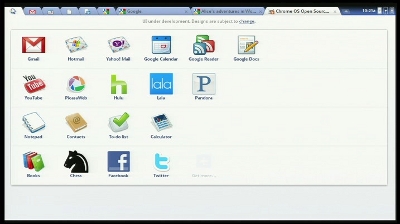There's been a bit of confusion lately over exactly what Google has planned for Chrome OS. At the moment, it's not even clear whether or not it will launch this year.
However, Linus Upson, the VP of engineering for Chrome, has been talking to the New York Times to give a little more insight into how the company views the platform.
ChromePad
The most interesting comment was that the OS is likely to find its way into everything from netbooks to tablets and TVs in the future. Upson mentioned that the company was "recalibrating its strategy and product mix" and that it would be "starting with laptops and [expanding] in both directions". This is in pretty direct opposition to comments made by CEO Eric Schmidt only a few weeks ago that implied that Android would be the platform of choice for touch-based devices.
Upson also suggested that a Google-branded netbook - believed to be going under the internal codenames Mario and Andretti at the moment - would still be released later this year, even though a full roll-out is thought to have been pushed into 2011.

Head in the clouds
He also took the chance to demonstrate just how independent the OS is from the hardware, and how a lot of people - including Google founder Sergey Brin - still struggle to wrap their heads around the concept.
"When people look at Chrome OS, they're going to be like, ‘It's just a browser, there's nothing exciting here - that's the point," he explained. The lightweight operating-system will act more as a portal to web apps and cloud storage than anything else. In theory, anyone will be able to log into a Chrome OS device and use it as if they were using their own system, with everything important being stored on Google's servers.
This makes administering the platform much easier for the end user, and according to Upson, up to 60 per cent of businesses could switch from Windows to Chrome OS immediately. Of course, this would put an awful lot of hardworking administrators and IT staff out of business, since updates, applications and storage are all handled by Google.
Chrome OS is still shrouded in mystery, but we're certain to find out a lot more over the coming months.













